Pacemakers and implantable cardioverter defibrillators (ICDs) are lifesaving devices but malicious actors can exploit vulnerabilities and result of it can be life-threatening.
If you think that computers have remained the apple of hackers’ eyes then you are mistaken because according to a research paper published in the JACC (Journal of the American College of Cardiology), there has been an increase in cyberattacks against medical devices especially the implantable ones including pacemakers and implantable cardioverter defibrillators (ICDs).
As per the findings of physicians from the Electrophysiology Council, hackers might soon be able to deactivate and/or reprogram several features of a pacemaker, which may lead to electric shocks, interference in wireless communications that aid doctors in tracking/monitoring patient’s condition and battery depletion.
Author of the paper Dr. Dhanunjaya Lakkireddy from the University of Kansas Hospital stated that hackers although haven’t managed to gain access to the pacemaker successfully but considering that no technology can be hundred percent fool-proof therefore, it is only a matter of time that hackers will be able to find loopholes in pacemakers as well.

It is also worth noting that heart devices that require software to run or depend upon wireless communications are most likely to be vulnerable to hack attacks and these attacks can be life-threatening for the patients. These devices are hacked for political or financial benefits. Therefore, doctors and government regulators must implement ‘aggressive’ methods to prevent hack attacks to ensure the safety of patients.
“Anytime devices operate through the internet it opens up a theoretical possibility. While hackers may not be able to influence the device parameters at this point in time, one could see the diagnostic information from a given device,” said Dr. Lakkireddy.
The modern pacemaker is like a tiny computer that is equipped with dedicated software and is implanted under the skin near the collarbone. Its purpose is to ensure that heart keeps on pumping actively as well as transmit information about the condition of the patient to the doctor and notify immediately if there is something wrong. With their hacking prowess, hackers can infect the software to drain the battery of pacemaker or turn off the device.
Moreover, if it is a case of ICD then it can deliver a heart-stopping shock to the patient. This sort of ‘intentional harmful interference’ can be detrimental to the health and well-being of the patients, which is why physicians are referring it as a credible threat.
“True cyber-security begins at the point of designing protected software from the outset, and requires the integration of multiple stakeholders, including software experts, security experts, and medical advisers,” said Dr. Lakkireddy.
Image credit: DepositPhotos

